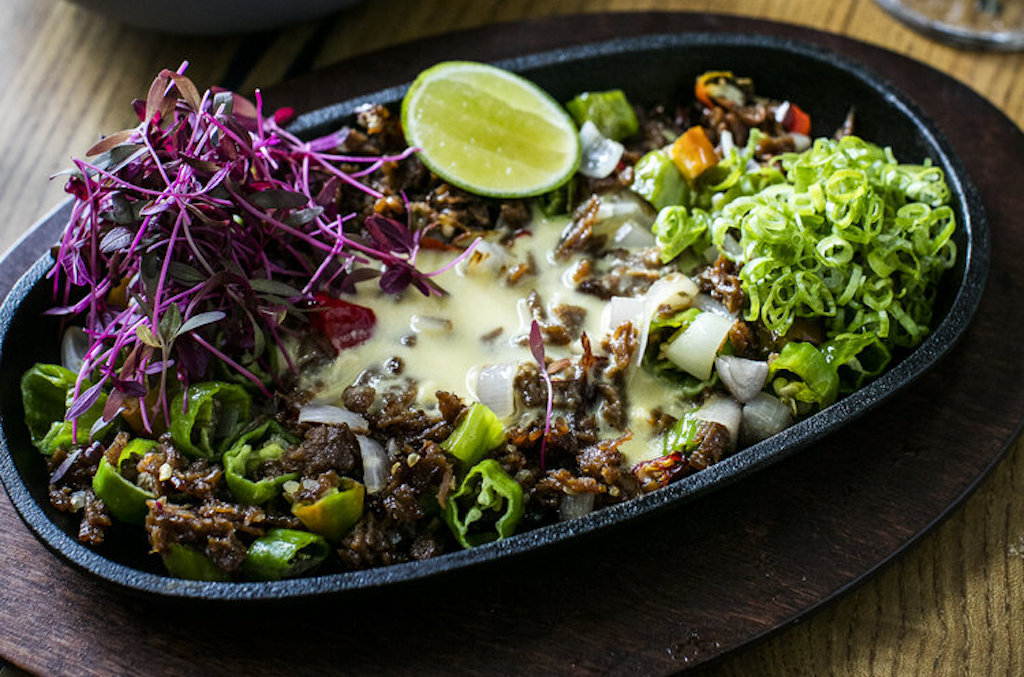Think of Filipino food, and it’s nearly impossible to imagine it without meat. That’s because most Tagalog and Kapampangan dishes, which comprise the country’s mainstream menu, have pork, beef, chicken or even innards as their main ingredient.
Regional cuisine from Luzon (outside Metro Manila), as well as Visayas and Mindanao, have mostly vegan dishes, though most of them are prepared or served with sauces or condiments—a defining Filipino component—such as bagoong.

In Northern Luzon, for example, pinakbet, a stew of squash, okra, eggplant, string beans and bitter gourd, is never without its source of umami and salty flavor: shrimp paste.
But a La Union-born chef in New York is trying to do without it. Raj Abat, the executive chef of Saramsam in East Village, is making Filipino favorites with plant-based ingredients.
[READ: Filipino food is no longer “the next big thing”—New York City’s pop-ups show us that they’re there to stay]


Being Ilocano, he has made sure pinakbet is on his menu. But instead of using fermented shrimp, he uses fermented vegetables.
Asked in an interview how difficult it was to recreate meat-centric Filipino dishes, Abat said it’s not that difficult. “We are doing regional Filipino cuisine from the Ilocos region of the Philippines. It relies a lot on the freshest vegetables. For example, in our pinakbet, we substituted house-fermented vegetables for the bagoong (fermented fish). You get the same results which is the funky flavor.”

French-trained Abat used to work in Indonesia before settling in New York where he became part of restaurateur Ravi DeRossi’s vegetable-forward bars and restaurants last year.
In the same interview with Abat, DeRossi said opening a plant-based Filipino restaurant “is built into the foundation of my company, Overthrow Hospitality.
“Animal rights and climate change are pivotal issues, not only for our restaurants, but for our world. More so now than ever, reintroducing a traditionally meat-heavy cuisine as plant-based sends a powerful message. It brings everybody to the table.”
[READ: Cosmic’s secret club makes a case for a veganized Poblacion]“Everyone” in Abat’s vocabulary means including his toughest critics: Filipino moms and titas, he told the Asian Journal—as well as hypertensive titos who constantly crave crispy pata but can’t eat it because of high blood and cholesterol issues.
Abat assures his kin, “Not here [at Saramsam]. It’s all vegetables.”
Name a widely-recognized Filipino dish and chances are they are in Saramsam’s developing menu. It has the peanut-based kare-kare with fermented black bean sauce, lumpia, sinigang, pancit canton and even sisig—all with plant-based meats and the freshest vegetables that Abat himself sources every day at the nearby market.

But a quick glance at the menu would have any diner think twice. The sisig, for one, is deceptively called sisig teriyaki and made with plant-based meat called “waygu.” Yes, you read that right. Waygu is a textured soy protein alternative to the prized beef developed through a Canadian-Japanese collaboration.
“I believe sisig can make or break any amazing Filipino restaurant. For our version, we use waygu and so far, we’re the only one in the New York and New Jersey area using it,” Abat said.
So far, Saramsam’s menu has a dozen offerings including a lone dessert based on halo-halo. But Abat is continuously experimenting in the kitchen to come up with other vegan Filipino wonders. These include dinuguan, tocino and longganisa.

The Abat-led restaurant has only been operational for a month, having opened towards the end of September. Like any other restaurant in the world, Saramsam is tiptoeing towards fully welcoming diners back amid the pandemic. But he remains hopeful, perhaps a little too hopeful.
On the menu is a kamayan feast option good for the whole family. It’s based on the communal way of eating we Filipinos enjoy. A tad risky given the current health situation, but it is a part of the Pinoy eating experience.

Like most of its Manhattan neighbors including Filipino restaurant Jeepney, coffee shop Kabisera and pop-up restaurant Tsismis, Saramsam is betting on everybody’s newfound fascination with Filipino food, hoping that first-time tasters can be converted to loyalists, who would see the cuisine as more than just a passing trend.
For Abat, this also means convincing diners that plant-based Filipino food is just as good as its meat-centric counterparts.
“We have taken out the meat components of the dishes but have kept the heart and soul of the cuisine, which is using the freshest, most seasonal and hyperlocal produce we can get from the farmer’s market. It won’t be exactly the same, but it will show diners the spirit of Filipino cooking and hospitality.”
Photos courtesy of Eric Medsker for Saramsam
Get more stories like this by subscribing to our weekly newsletter here.
Read more:
Halo-halo, maja blanca doughnuts draw 800-person waitlist in NY. How come we don’t have them here?
Carinderia-style Filipino restaurant in Seattle wins James Beard award
Writer: CHRISTIAN SAN JOSE




